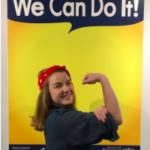Sexual violence is terrifyingly common, affecting 81 percent of women and 43 percent of men (the percent of nonbinary people isn’t listed). But did you know bi people are at a higher risk than people of other sexual orientations? Yep. While 35 percent of heterosexual women and 44 percent of lesbian women have experienced sexual or intimate partner violence (which is also too high a number), the rate is almost double the heterosexual rate for bisexual women. Clearly, sexual violence is an intersectional, feminist issue.
In honor of April being Sexual Assault Awareness Month, let’s talk about this, including the misconceptions and how you can support a bisexual and/or biromantic survivor.
Bi stereotypes aren’t the reasons for the higher rate — the effects of them are
Wondering why bi people are most at risk? It’s important to note the common stereotypes we hear about this community are not only not reasons, but they aren’t true, either.
“Bisexual stereotypes are alive and well, and I believe this leads to more victimization,” said E.J. Smith, a licensed professional counselor, sexual assault victim advocate, and bisexual survivor. “One of the most insidious and troublesome myths is the one that ‘Bi people want to sleep with everyone.’ This leads to a social hypersexualization… People may feel entitled to sex when they go out with a bisexual person,” she explained. Misconceptions like these prove the way we talk about sexual violence matters.
Smith has even heard these myths from well-respected professionals who claim bi people sleep with others more often, and are therefore exposing themselves to more unsafe situations. “That’s victim-blaming, y’all,” Smith said.
(Since even professionals hold these inaccurate beliefs, bi survivors need to know not all therapists will be the right, most educated fit, and that that doesn’t mean therapy can’t be helpful with the right person!)
Additionally, Smith noted some men think they can “turn queer women straight” — a harmful and untrue thought — and that sexual violence doesn’t only occur in opposite-gender relationships.
How to support bi survivors of sexual violence
For the most part, supporting sexual assault survivors entails the same key pieces. “Believe them. That’s always the first step,” Smith said. “Don’t allow victim-blaming or sexual-shaming remarks to go unchallenged, either by the victim or anyone else.”
Encouraging (not forcing) professional support is a good idea, too, according to Smith. While many survivors find therapy necessary to heal, they’ve already had their autonomy and sense of power taken away once. Don’t do it again by pressuring them to go to therapy or do something else they aren’t comfortable with yet.
According to the Rape, Abuse and Incest National Network (RAINN), it’s also helpful to remind survivors they aren’t at fault, didn’t deserve what happened to them, aren’t alone, that you admire their courage in sharing, and that you’re there for them.
If you’re not sure what next steps to take or need more specific advice, call the experts! Smith recommended RAINN or your local rape crisis center. An amazing, local example of the latter is the Orange County Rape Crisis Center (OCRCC) in Chapel Hill. They offer support groups, workshops, education, therapy, outreach opportunities, and more. You can check out the contact page for their address, helplines, business line, and hours here.
Other than those general tips that are good ideas across the board, you can support bi survivors specifically by educating yourself about bi issues, not assuming the gender of the person who hurt them, and letting them know those common myths are just that — myths. Even if you aren’t currently supporting a bi survivor, doing these things is crucial.
Last but not least, you can show your support for all bi survivors — not just the ones you know — by participating in advocacy efforts and talking about the issue.
“It’s important to talk about the higher risk for bisexual people so that their concerns and issues can be highlighted and better understood,” Smith said. “Sometimes the messaging comes across in a way that makes it victim-blamey, or unintentionally reinforces stereotypes hypersexualizing bisexual people. Messages should focus on the importance of consent and sexual autonomy for all sexual orientations — including bisexuals.”
If you or a loved one have experienced sexual violence, you’re not alone and help is available. You can contact RAINN by calling 800-656-4673 or visiting online.rainn.org.
 Ashley Broadwater is a recent graduate of UNC-Chapel Hill, where she studied Public Relations in the Hussman School of Journalism and Media. She’s passionate about mental health, body positivity, relationships, Halloween, and Dad jokes.
Ashley Broadwater is a recent graduate of UNC-Chapel Hill, where she studied Public Relations in the Hussman School of Journalism and Media. She’s passionate about mental health, body positivity, relationships, Halloween, and Dad jokes.


I am but and was severely assaulted last year by a man that insisted that all bi women are loose. I never reported this man to my rural MTN sheriff’s department because I have heard from too many other rape and sexual assault survivors in my town that it’s pointless. These women are shamed and scoffed by the department and the outcome is always we are not believed and the assaulter is never charged. I guess we are supposed to endure this because we deserve it.